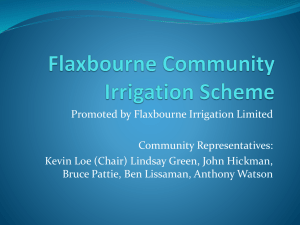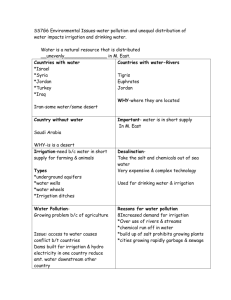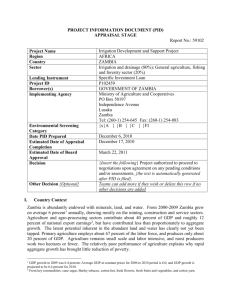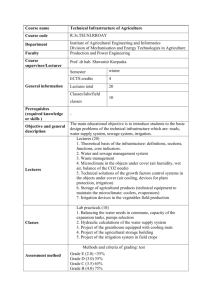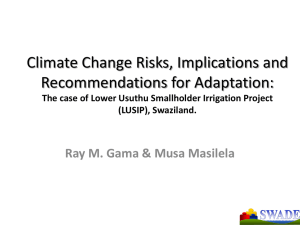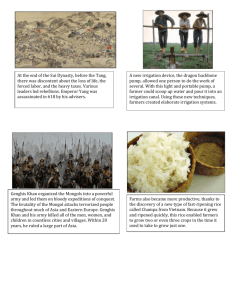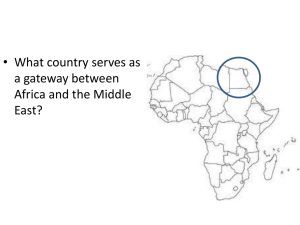Project Name - Documents & Reports
advertisement
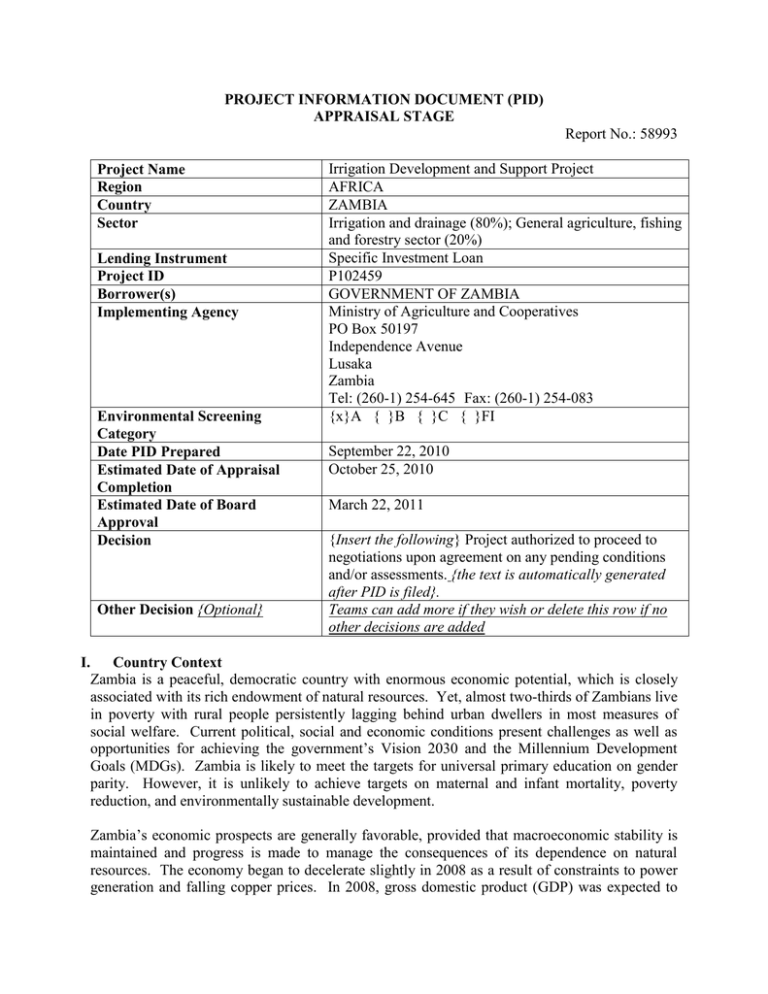
PROJECT INFORMATION DOCUMENT (PID)
APPRAISAL STAGE
Report No.: 58993
Project Name
Region
Country
Sector
Lending Instrument
Project ID
Borrower(s)
Implementing Agency
Environmental Screening
Category
Date PID Prepared
Estimated Date of Appraisal
Completion
Estimated Date of Board
Approval
Decision
Other Decision {Optional}
I.
Irrigation Development and Support Project
AFRICA
ZAMBIA
Irrigation and drainage (80%); General agriculture, fishing
and forestry sector (20%)
Specific Investment Loan
P102459
GOVERNMENT OF ZAMBIA
Ministry of Agriculture and Cooperatives
PO Box 50197
Independence Avenue
Lusaka
Zambia
Tel: (260-1) 254-645 Fax: (260-1) 254-083
{x}A { }B { }C { }FI
September 22, 2010
October 25, 2010
March 22, 2011
{Insert the following} Project authorized to proceed to
negotiations upon agreement on any pending conditions
and/or assessments. {the text is automatically generated
after PID is filed}.
Teams can add more if they wish or delete this row if no
other decisions are added
Country Context
Zambia is a peaceful, democratic country with enormous economic potential, which is closely
associated with its rich endowment of natural resources. Yet, almost two-thirds of Zambians live
in poverty with rural people persistently lagging behind urban dwellers in most measures of
social welfare. Current political, social and economic conditions present challenges as well as
opportunities for achieving the government’s Vision 2030 and the Millennium Development
Goals (MDGs). Zambia is likely to meet the targets for universal primary education on gender
parity. However, it is unlikely to achieve targets on maternal and infant mortality, poverty
reduction, and environmentally sustainable development.
Zambia’s economic prospects are generally favorable, provided that macroeconomic stability is
maintained and progress is made to manage the consequences of its dependence on natural
resources. The economy began to decelerate slightly in 2008 as a result of constraints to power
generation and falling copper prices. In 2008, gross domestic product (GDP) was expected to
grow by 5.8 percent compared to 6.3 percent in 2007, and further decline to about 4.3 percent in
2009 as a result of the global slowdown on copper prices and lower copper demand as well as
weaker than expected economic activity and domestic demand. Due to mineral price upwards
swings and favorable weather, strong performances were realized in the mining and agriculture
sectors in 2009, with a 13 percent increase in copper production and a bumper agricultural
harvest. The economy is expected to return to faster growth in 2010 (about 6 percent) as copper
prices are forecast to rise again.
II.
Sectoral and Institutional Context
Agriculture and agro-processing are important sectors in Zambia’s economy, representing more
than 40 percent of GDP and contributing to roughly 12 percent of national export earnings.
Agriculture is critical to economic growth. The sector employs about 67 percent of the labor
force and supplies raw materials to agro-processing industries accounting for roughly 84 percent
of manufacturing value-addition. Between 1990 and 1994, agricultural exports doubled from
US$30 million to US$61 million and by 2006 had reached about US$300 million. However,
rural poverty has remained persistently high, as growth over the past decade has not provided
sufficient opportunities for the rural poor who depend heavily on farming for their livelihood.
Poverty in Zambia is largely a rural phenomenon, affecting 81percent of rural population but
only 34 percent of urban dwellers. Although Zambia is more urbanized (35 percent) than most
African nations, two-thirds are smallholder farmers. Any strategy to reduce poverty and make
growth more inclusive for Zambia must include a leading role for rural growth and development
provided there is a substantial focus on smallholder agriculture and infrastructure, as well as
other non-farm employment.
About 0.3 million or one quarter of smallholders are linked to agribusiness through vertically
integrated value chains mainly in cotton, tobacco1, sugarcane and high value horticultural crops.
Availability of land and low production costs make smallholders attractive partners for
agribusinesses needing access to raw materials for processing and exports. There is a perception
that smallholders, who are integrated in commercial value chains, are being exploited because
other participants in the value chain, such as middlemen, traders and processors, tend to reap a
greater share of the returns. This perception undermines trust and cooperation among value
chain participants, thus preventing them from pursuing market opportunities with added value
for fresh products, organics or better quality. To address these concerns, the World Bank
undertook a study (in 2009) to determine the costs and benefits of smallholders’ participation in
Zambia’s commercial value chains and whether it was worthwhile to support their participation2.
The study found that smallholders benefit considerably from participation, specifically: (a)
returns to family labor are consistently positive; (b) food crop production is not abandoned in
lieu of participation in value chains for commercial crops since inputs supplied to commercial
crops, especially fertilizer, are also beneficial to food crops; and (c) commercial crops also
1
Tobacco waiver was granted by Bank Management because many smallholders cultivate and depend on tobacco as a key source
of income in project target areas. On the basis of recent production trend data and tobacco industry trends, it is expected that
only a small share of the project budget will be directly attributable to this crop and through provision of access to irrigation
water, smallholders will have a wider menu of crop choices. Project will monitor the investment share of the project and
eligibility criteria will be adapted if tobacco related investment starts to depart significantly from recent trends. It is not
envisaged that smallholder tobacco production will reach earlier peak levels of cultivation under irrigation in project command
areas.
2 World Bank Report No. 48774-ZA, June 2009: Commercial Value Chains in Zambian Agriculture: Do Smallholders Benefit?
provide cash to invest in human and physical capital. Weak contract enforcement was found to
be the key constraint affecting most commercial smallholders involved in value chains.
Global food price volatility poses challenges to food security at national and household level but
it also offers opportunities for the agricultural sector because of the likely long-term structural
increase in food prices. Farmers in Zambia are trying to increase agricultural production and
secure long-term access to water for irrigation. Smallholder irrigation is one of the keys to
developing a competitive rural sector. Review of past efforts to support smallholder irrigation in
Zambia have not met expectations for two reasons: (i) institutional constraints and incentives at
the scheme level that impede proper operation and maintenance (O&M); and (ii) market access
constraints due to poor organization of value chains and lack of complementary infrastructure
investment. In addition, a key binding constraint to agricultural growth is poor access to and
high cost of finance not only for short term credit but also for long term credit. Smallholder
access to both forms of credit is limited while the source of available finance comes from high
cost, short term financial instruments.
Given the multi-sectoral nature of issues affecting smallholder agriculture, opportunities for
effective government and donor support can be organized around three strategies: (a) strengthen
market mechanisms and value chains, including access to market and price information;
improving market linkages and value chain organization; addressing the issue of contract
enforcement in value chains and irrigation schemes; and promoting public-private partnerships
(PPPs) in extension and learning to improve value chain performance; (b) address critical policy
issues in the agricultural sector, in particular, budget allocations for a poorly targeted fertilizer
subsidy and unpredictable trade policy with periodic export bans. Improvement is also needed in
the business environment, which is constrained by a complex licensing regime; and (c) invest in
infrastructure, including transport, energy, telecommunications and irrigation, making use of
PPPs where opportune.
The Government’s policy environment remains critical to raising the incomes of millions of
Zambian smallholder farmers. Government’s intention to reintroduce the Agriculture Marketing
Bill designed to enhance smallholder farmers’ access to markets and to include warehouse
receipting is an important policy intervention that is expected to provide a favorable environment
for the proposed project.
III.
Project Development Objectives
The project development objective is to increase agricultural productivity and products marketed
from irrigation development support to smallholder farmers in targeted high potential sites.
IV.
Project Description
Component 1: Irrigation Agriculture Support Services (US$17.1 million total, including an
IDA contribution of US$14.51 million)
The objective of this component is to provide resources related to knowledge and skills, and to
strengthen beneficiary capacities required to prepare and operate medium to large size
smallholder irrigation schemes on a sustainable commercial basis and through the use of PPPs.
The component more specifically will provide funding for:
(a)
(b)
(c)
Irrigation scheme planning and preparation, including: pre-feasibility and
feasibility studies; environmental and social management planning; participatory
decision making process supported by transaction advisory services; land tenure
and land (re-)allocation issues.
Professional scheme operation and marketing services using a PPP approach,
including: irrigation scheme development and O&M, and agricultural and
marketing services and support services.
Community mobilization and capacity building, including: community
sensitization and mobilization, and capacity building of the Water User
Associations (WUAs), producer organizations and micro-enterprises.
Component 2: Public Infrastructure (US$53.98 million total, including an IDA contribution of
US$39.46 million)
The objective of this component is to provide the public infrastructure required to establish
medium to large size smallholder irrigation schemes for agricultural purposes using appropriate
PPPs. The component will provide funding for:
(d)
Irrigation infrastructure, including: bulk water storage, supply and drainage
infrastructure up to farm gates; and within scheme roads.
(e)
Supporting infrastructure, including: access service roads to rural project sites;
electrification; storage facilities, and drinking water points.
(f)
Implementation of site specific Environmental Management Plans (EMPs) and
Resettlement Action Plans (RAPs).
Component 3: Private and Cooperative Investment (US$54.0 million total, including an IDA
contribution of US$33.05 million)
The objective of this component is to facilitate private and cooperative investment in productive
equipment and assets in and around the irrigation schemes, and to stimulate the establishment of
small agri-enterprises. The component will provide funding for:
(g)
Facilitation of access to long-and short term financing and investment capital,
including the following: facilitation of access to credit; and networking and
linkage facilitation of access to investment support.
(h)
Investment Support Fund (ISF), including conditional partial grants for on-farm
irrigation equipment; other on-farm equipment and assets; highly specialized
production inputs; post-harvest and value adding equipment and assets; highly
specialized essential inputs for production and marketing grant for non-traditional
activities; and seed capital for small enterprise development. The fund includes a
specialized window for women, youth and other vulnerable groups (previously
resettled people).
Component 4: Management and Coordination.(US$8.9 million total, including an IDA
contribution of US$7.62 million)
The objective of this component is to ensure efficient and timely project resources management
and use in accordance with the project’s objectives and Bank and GRZ procedures to deliver
expected results and outcome. It will also support the policy and institutional framework. The
component will provide funding for: (a) Management of the project; (b) Support the policy and
institutional framework; (c) Safeguards issues management and oversight; and (d) Monitoring
and evaluation.
V.
VI.
Financing
Source:
Borrower/Recipient
IBRD
IDA
Others: Co-financing (Beneficiaries)
Total
($m.)
17.29
100
24.19
141.48
Implementation
The project will be implemented under the overall responsibility of MACO. The Department of
Agriculture (DA) within MACO will be the lead implementing agency and a National
Coordinator IDSP (NC-IDSP) under the Director of Agriculture will be responsible for the
overall project coordination. MACO’s DA will contract service providers to implement
Component 1: Irrigated Agriculture Support Services, and private contractors to implement
Component 2: Public Infrastructure. A service provider will also be hired to manage the
investment support fund (ISF) grant fund facility, under Component 3 Private and Cooperative
Investment, similar to implementation arrangements of ADSP. The Component 4: Management
and Coordination will be under the direct responsibility of NC-IDSP.
A National Project Steering Committee (NPSC) will be chaired by the Permanent Secretary
(Agriculture) of MACO; the NC-IDSP will serve as its Secretary. NPSC members will include
the Directors of the Departments of Agriculture, Agri-Business & Marketing (DABM), and
Policy and Planning (DPP), as well as representatives of the Ministry of Energy and Water
Development (MEWD), the PPP Unit of the Ministry of Finance and National Planning (MFNP),
the Zambia National Farmers Union (ZNFU) or a suitable representative of national level
producer organizations, and possibly the Agricultural Consultative Forum (ACF), the National
Consultation Council (NCC), the Bankers Association of Zambia (BAZ) and the Zambia
Agricultural Research Institute (ZARI). Representatives of the Site Committees or the Utility
Companies will participate as NPSC observers. The NPSC will approve the Annual Work Plans
and Budgets (AWPBs) and annual procurement and training plans, give no objection to signing
Irrigation Development Contracts (IDCs), provide guidance on project implementation, and
resolve any issues of a policy nature that might arise. The NPSC will meet at least quarterly and
extraordinary meetings could be called by the chair if needed. The minutes of these meetings
will be shared as appropriate.
The NC-IDSP will be supported by an Irrigation Engineer, an Agri-Business Specialist, and a
Quality Management Officer and an Office Assistant provided by MACO. These four staff
would be dedicated full time to the project. A Technical Committee will be nominated from
within the DA’s Technical Services Branch (TSB) and from other relevant implementing
agencies (MACO-DABM, MEWD, RDA, ZESCO, MFNP-PPP Unit) to contribute to project
supervision on an as needed basis.
The National Coordination Office (NCO) of the ADSP, established in 2006 within MACO’s
PPD, will provide the following support functions to NC-IDSP: (i) disbursement of project
funds, replenishment of project bank accounts, and processing of withdrawal applications; (ii)
maintenance of project documentation, including special account reconciliations and M&E
reports; and (iii) provision of safeguards and M&E functions for the project. The ADSP-NCO is
led by a National Coordinator (NC-ADSP) and supported by a team assistant, an economist and
accountant, MACO support staff, and two externally recruited staff: Safeguards Specialist and
M&E Specialist.
The NC-IDSP will work closely with the PPP Unit of MFNP. A Liaison Officer will be
nominated by this Unit while its Director will be member of the NPSC. The PPP Unit will
advise the NC-IDSP on PPP-related matters and will be in charge of processing the IDCs in
accordance with the provisions of the PPP Act, including their presentation and approval by the
PPP Technical Committee and the PPP Council. MACO, represented by the PS, will serve as
Government’s contracting authority for the PPP contracts.
Although the project will not fully decentralize its project management activities that will be
contained at NC-IDSP, irrigation site specific activities will be done in close collaboration with
the provincial agricultural offices (PACO) and district agricultural offices (DACO). The MACO
decentralized extension officers will be fully integrated in implementing site specific work plans.
For each irrigation site, a Liaison Officer will be nominated by the District Agriculture and
Cooperatives Office (DACO) and will provide full time project supervision at site level. Under
Component 1, Site committees will be established at planning and preparation stages to interact
with the consultants responsible for the feasibility studies and transaction advisory services and
provide feedback to MACO on progress made and on the proposed partnership arrangements.
Membership of the Site specific committees will be drawn from the existing Area Development
Committee and include representatives from the key stakeholders and potential investors. The
DACO Liaison Officer will serve as the Site committee secretariat with the support from the
Transaction Adviser (see below).
MACO will contract a Transaction Adviser, a consulting company experienced in irrigation
development, PPP and commercial agriculture support through a performance-based contract for
the duration of the project where a (part of the remuneration will be fee-based –e.g. according to
the actual volume of transaction) The Adviser will provide support to local stakeholders and
GRZ in the establishment of IDCs and Utility and Farm Management Companies (UtilityCo and
FarmCo respectively) for each site and help GRZ identify new sites.
Irrigation Development Contracts (IDCs) will govern the construction, management and O&M
of irrigation schemes. They will be structured as a Build-Transfer-Operate (BTO) type of a PPP
contractual agreement. IDCs will be established between GRZ and skilled (qualifying)
Contractors/Developers who will: (i) be selected through a competitive international
procurement process; (ii) construct the bulk water supply and associated infrastructure; and (iii)
ensure the first years of scheme management, and O&M with financial support from the project.
The Developer, as part of the IDC, will support the establishment of site specific UtilityCo and
FarmCo that will be responsible for long-term management of a particular scheme in a given site
and represent the interests of the irrigation scheme smallholders, water-user associations, and
their commercial (value chain) partners, while ensuring professional management, O&M after
the Developer’s contract (UtilityCo and FarmCo) closes.
The Investment Support Fund (ISF) or the productive investment support fund will be
administered by an independent Fund administrator. This entity will be a private sector entity or
a Non-Governmental organization (NGO) with a demonstrated experience in fiduciary
qualifications for fund administration and agribusiness experience to link the smallholders in
project sites along value chains with the market. The Fund administrator will coordinate and
manage the ISF to provide demand driven co-financing subproject grants implemented by the
eligible project beneficiaries.
Implementation of access to other infrastructure: Rehabilitation and maintenance of rural roads
in each irrigation site will be implemented using implementation arrangements currently adopted
under the Rural Roads Improvement Facility (RRIF) of ADSP and that of Bank funded Road
Rehabilitation and Maintenance Project II (RRMPII). Project is designed such that the rural
access roads will be built under the same contract as the irrigation scheme (for economies of
scale) and through an MOU with Roads Development Agency (RDA) transfer the ownership and
further maintenance of road after construction will take place. The RDA will act on behalf of the
NC-IDSP as the oversight body in consultation with the National Roads Fund Agency (NRFA).
This arrangement is adopted to ensure that all rural access roads in project sites are considered as
a part of national grid and that the sustainability of rural road improvement and maintenance
beyond the project period under the National Road Fund. It is also in compliance with the
Zambia legislation where RDA is the manager of all road projects.
The Detailed project manuals and frameworks, including a Project Implementation Manual
(PIM) containing following modules: Project M&E Manual, Project Administrative, Financial
and Accounting Manual, PPP manual, Project Engineering and ESMF and RPF are being
prepared and finalized prior to effectiveness. Draft outline IDCs are being prepared for the three
pilot sites during project preparation with the support of a temporary transaction advisor and in
close consultation with the private sector with a view to defining attractive risk sharing
arrangements for both public and private parties.
VII.
Safeguard Policies (including public consultation)
The project is rated as environmental category “A”. The project has limited to moderate adverse
environmental and social impacts, triggering the following safeguard policies:
Safeguard Policies Triggered by the Project
Environmental Assessment (OP/BP 4.01)
Natural Habitats (OP/BP 4.04)
Pest Management (OP 4.09)
Physical Cultural Resources (OP/BP 4.11)
Involuntary Resettlement (OP/BP 4.12)
Indigenous Peoples (OP/BP 4.10)
Forests (OP/BP 4.36)
Yes
No
x
x
x
x
x
x
x
Safety of Dams (OP/BP 4.37)
Projects in Disputed Areas (OP/BP 7.60)*
Projects on International Waterways (OP/BP 7.50)
VIII.
x
x
x
Contact point at World Bank and Borrower
World Bank
Contact:
Title:
Tel:
Email:
Indira Janaki Ekanayake
Snr. Agriculturist
5338+3262 / 260-211-252-811
iekanayake@worldbank.org
Borrower/Client/Recipient
Contact:
Dr. Situmbeko Musokotwane
Title:
Minister of Finance & National Planning
Tel:
Email:
Implementing Agencies
Contact:
A.K. Banda
Title:
Permanent Secretary for Agriculture, MACO
Tel:
Email:
IX.
For more information contact:
The InfoShop
The World Bank
1818 H Street, NW
Washington, D.C. 20433
Telephone: (202) 458-4500
Fax: (202) 522-1500
Web: http://www.worldbank.org/infoshop
*
By supporting the proposed project, the Bank does not intend to prejudice the final determination of the parties' claims on the
disputed areas
